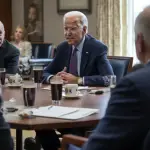Israeli Prime Minister Benjamin Netanyahu has officially squashed the latest round of media chatter, denying reports of a top-secret, top-tier phone conversation with former President Donald Trump regarding a hostage deal with Hamas. Imagine the surprise: the media got it wrong again! In what can only be described as a classic example of left-wing sensationalism, Netanyahu’s office made it clear that there was no such call, firmly asserting that the two did not exchange pleasantries or negotiate world events over the phone.
The source of the hysteria was a report from Axios claiming that Trump had spoken to Netanyahu, allegedly advising him to consider a hostage deal. By the time coffee was brewing the next day, Netanyahu’s office was already debunking the story. The takeaways here are clear: media excitement doesn’t always equal reality, and the liberal narrative is in desperate need of a fact-check.
Netanyahu denies report that he spoke with Trump about hostage deal https://t.co/nkHyUZh5b2
— Washington Examiner (@dcexaminer) August 15, 2024
Meanwhile, while the press busy themselves with false narratives, Israel has more pressing concerns, preparing to reenter hostage negotiations with Hamas in Doha, Qatar, alongside the ever-influential mediators from the United States and Egypt. Apparently, high-level talks can’t wait for the media to get their stories straight. It’s hard to imagine that the fate of hostages would hinge upon the latest back-and-forth gossip between political figures, but that doesn’t stop the media from trying to stir the pot.
Notably, Netanyahu and Trump were recently seen sharing a delightful meeting at Mar-a-Lago last month—proving that despite some rocky patches, the bond established during Trump’s presidency remains significant. Their relationship soured somewhat after Netanyahu congratulated President Biden following his electoral victory. However, one wonders if this latest flare-up in media misinformation might rekindle the alliance, taking a step back from the Biden administration’s tepid approach to foreign policy.
The overarching backdrop of these diplomatic tête-à-têtes is a Middle East tense as a rubber band stretched to its limit. Following Hamas’s audacious attack on October 7, skirmishes continue to erupt not just in Gaza but along the Lebanese border, where Hezbollah sits billowing smoke and rhetoric. With a promise of retaliation from Iran hovering ominously over Israel, it would seem that while the media might be fixated on misplaced phone calls, the real drama unfolds on the battlefield—one that’s waiting for sparks to fly at any moment. And as always, the world remains on the edge of its seat, half-expecting to witness the next headline-making attack.




